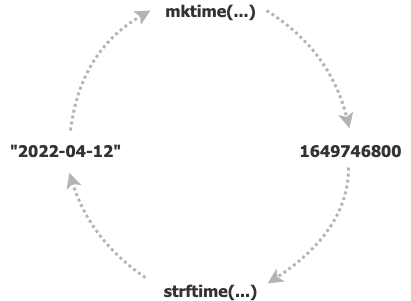Parsing and Validating Dates in Awk
I recently stumbled on something that I thought would be easy: parsing and validating dates in Awk.
Some guidelines:
- ISO 8601 format, e.g.
2022-04-12 - months between 01 and 12
- days between 01 and 28-31 (depending on the month, leap year)
A quick lookup for GNU Awk’s time functions points to mktime("YYYY MM DD HH MM SS")
Let’s try it:
> echo "2022 04 12" | awk '{ print mktime($0 " 0 0 0") }'
1649746800
# removed hyphens for now, will fix in solution below
# padded HH MM SS with 0 0 0, to keep mktime happyLooking good! How about something wrong?
> echo "not a date" | awk '{ print mktime($0 " 0 0 0") }'
-1Oh yeah! What about a “bad” date?
> echo "2022 44 78" | awk '{ print mktime($0 " 0 0 0") }'
1760684400Wait, what?! Oh no……..
Going Full Circle
If invalid dates returned -1, we would be done by now.
1760684400 is 2025-10-17 … mktime takes 44 and 78 and (probably) multiplies those by seconds-per-month, and
seconds-per-day.
When I looked at the other time functions, there didn’t seem to be anything that helped either.
The eureka! was to think about using the invalid date to format a date back to ISO 8601 format. If the input and output dates are different, the date is wrong!
# good example
> echo "2022 04 12" | awk '{ d = mktime($0 " 0 0 0"); print strftime("%F", d) }'
2022-04-12
# bad example
> echo "2022 44 78" | awk '{ d = mktime($0 " 0 0 0"); print strftime("%F", d) }'
2025-10-17Sidenote: I’m using %F to format dates. man 3 strftime says:
%F Equivalent to %Y-%m-%d (the ISO 8601 date format)
Test Script
Here’s my test cases:
> cat test.txt
2022-04-12 -- regular day
bad_date -- not even a date
1981-11-20 -- 1980s
2022-44-78 -- nonsense month/day
2022-09-30 -- september has 30 days
2022-09-31 -- but not 31 ...
2016-02-28 -- leap year: february has 28 days
2016-02-29 -- leap year: even 29 days
2016-02-30 -- leap year: but not 30 days
2000-02-28 -- special leap year: february has 28 days
2000-02-29 -- special leap year: even 29 days
2000-02-30 -- special leap year: but not 30 days
2001-02-28 -- regular year: february has 28 days
2001-02-29 -- regular year: but not 29 days
2001-02-30 -- regular year: but not 30 days
1965-04-12 -- past, before 1970
1935-04-12 -- past, before 1970The Awk script:
# hyphens now removed
> cat test.awk
{
date = mktime(gensub("-", " ", "g", $1) " 0 0 0")
if (strftime("%F", date) != $1) {
print "bad: ", $0
next
}
print "good:", $0
}Results:
> awk -f test.awk test.txt ~/Documents/blog (main)
good: 2022-04-12 -- regular day
bad: bad_date -- not even a date
good: 1981-11-20 -- 1980s
bad: 2022-44-78 -- nonsense month/day
good: 2022-09-30 -- september has 30 days
bad: 2022-09-31 -- but not 31 ...
good: 2016-02-28 -- leap year: february has 28 days
good: 2016-02-29 -- leap year: even 29 days
bad: 2016-02-30 -- leap year: but not 30 days
good: 2000-02-28 -- special leap year: february has 28 days
good: 2000-02-29 -- special leap year: even 29 days
bad: 2000-02-30 -- special leap year: but not 30 days
good: 2001-02-28 -- regular year: february has 28 days
bad: 2001-02-29 -- regular year: but not 29 days
bad: 2001-02-30 -- regular year: but not 30 days
good: 1965-04-12 -- past, before 1970
good: 1935-04-12 -- past, before 1970I was surprised that pre-1970 (epoch) also worked! Their mktime values are negative:
> echo "1935 04 12" | awk '{ print $0, "=>", mktime($0 " 0 0 0")}'
1935 04 12 => -1095782400
> echo "1969 12 31" | awk '{ print $0, "=>", mktime($0 " 0 0 0")}'
1969 12 31 => -57600
> echo "1970 01 01" | awk '{ print $0, "=>", mktime($0 " 0 0 0")}'
1970 01 01 => 28800